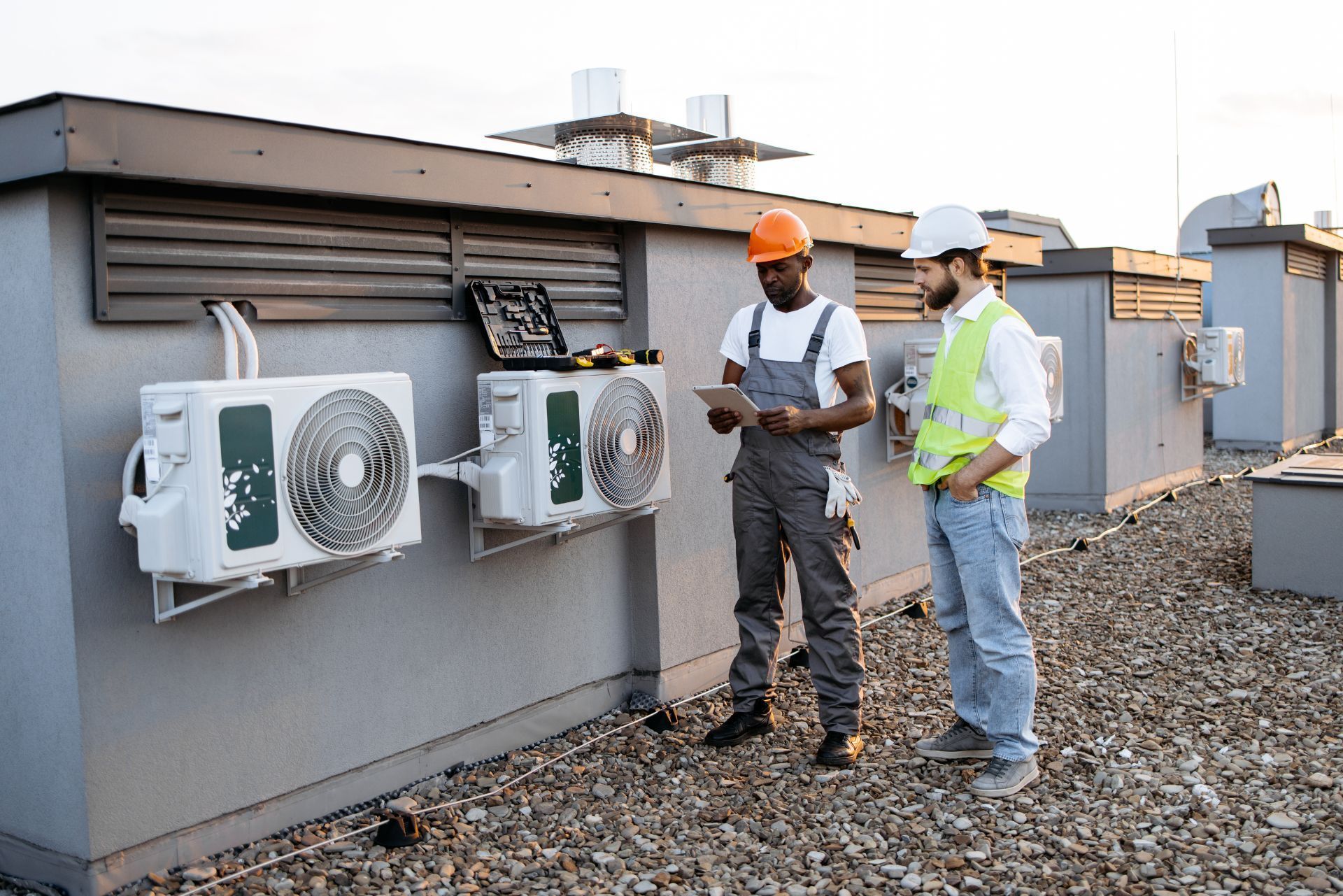Top 3 Recommended Policies

Connecticut’s weather keeps HVAC contractors busy in every season. From freezing winters that strain heating systems to humid summers that push air conditioning units to their limits, there is constant demand for skilled HVAC professionals across the state. But with steady work comes exposure to risk. Accidents on job sites, damaged equipment, and rising insurance costs can quickly impact a contractor’s bottom line. This guide explains what HVAC contractor insurance in Connecticut covers, why it matters, and how local conditions and market trends affect your premiums. Whether you work independently or manage a full team, understanding your coverage options will help you keep your business protected and running smoothly throughout the year.
Why Insurance Is Critical for Connecticut HVAC Contractors
HVAC contractors face a wide range of risks daily. From handling heavy equipment to working in tight spaces, the potential for accidents is significant. General liability insurance is often considered the foundation of any contractor’s risk management strategy. It covers third-party injuries, property damage, and legal defense costs—elements that can otherwise derail a project or threaten the survival of a growing business.
Experts at Insure Connecticut emphasize that general liability insurance protects contractors from costly lawsuits and claims, which are unfortunately common in the trades. Without this coverage, a single accident could lead to devastating financial consequences.
Moreover, Connecticut’s HVAC industry is experiencing a slight decline of about 1.3% annually from 2020 to 2025, which contrasts with national growth trends. This makes prudent financial planning and risk mitigation through insurance even more important to maintain business stability during leaner periods.
In addition to general liability insurance, HVAC contractors should consider other specialized coverages tailored to their unique needs. For instance, equipment insurance can safeguard against the loss or damage of essential tools and machinery, which are often significant investments. Given that HVAC work frequently involves expensive and specialized equipment, having coverage that protects these assets can prevent unexpected costs that could otherwise cripple a business. Furthermore, workers' compensation insurance is not just a legal requirement in Connecticut; it also provides essential protection for contractors and their employees in case of workplace injuries, ensuring that medical expenses and lost wages are covered, thus fostering a safer working environment.
As contractors navigate the complexities of the HVAC industry, understanding the nuances of their insurance options becomes crucial. The landscape of regulations and compliance in Connecticut is continually evolving, and staying informed about these changes can help contractors avoid potential pitfalls. Engaging with an insurance professional who specializes in the construction and HVAC sectors can provide invaluable insights, ensuring that contractors not only meet legal requirements but also tailor their coverage to address specific risks associated with their operations. This proactive approach to risk management can ultimately lead to a more resilient business, capable of weathering both economic fluctuations and the inherent uncertainties of the industry.

Types of Insurance Every Connecticut HVAC Contractor Should Consider
General Liability Insurance
General liability insurance is the backbone of contractor insurance packages. It protects your business if a third party suffers bodily injury or property damage related to your work. This coverage also includes legal defense costs if you face a lawsuit. For HVAC contractors, this might cover incidents like a customer slipping on a tool you left behind or accidental damage to a client’s property during installation.
According to a study analyzing over 1,100 HVAC contractor insurance quotes nationwide, general liability premiums typically range from 1.3% to 2.6% of annual revenue. In Connecticut, a small HVAC business with around $150,000 in revenue might expect to pay approximately $3,500 annually for general liability coverage, which aligns with this range. It’s important to note that the specifics of your coverage can vary based on factors such as your business's size, the types of services you offer, and your claims history. Therefore, it’s advisable to consult with an insurance professional who understands the unique risks associated with HVAC work to ensure you have adequate coverage tailored to your needs.
Workers’ Compensation Insurance
Given the physical nature of HVAC work, employees are at risk of injuries on the job. Workers’ compensation insurance is mandatory in Connecticut for businesses with employees and covers medical expenses and lost wages if a worker is injured while performing their duties.
On average, the cost of workers’ compensation insurance for an HVAC employee in Connecticut is about $1,489 per year. This coverage not only protects your employees but also shields your business from potential lawsuits related to workplace injuries. Additionally, having workers’ compensation insurance can enhance your company's reputation, demonstrating to potential clients that you prioritize safety and employee welfare. This can be a significant factor in winning contracts, as many customers prefer to work with contractors who are fully insured and compliant with state regulations.
Business Owner’s Policy (BOP)
Many HVAC contractors find that a Business Owner’s Policy (BOP) offers a streamlined and cost-effective way to bundle essential coverages. A BOP typically combines general liability, property insurance, and business interruption insurance into one package tailored for small to mid-sized businesses.
Insure Connecticut highlights that a BOP isn’t bloated with unnecessary extras—it’s designed specifically for tradespeople. Whether you’re a solo technician or managing a crew of up to 10 people, a custom HVAC insurance package through a BOP can simplify your coverage and potentially save money compared to purchasing policies separately. Furthermore, a BOP can also include additional coverages such as equipment breakdown insurance, which is particularly relevant for HVAC contractors who rely on specialized tools and machinery. This added layer of protection ensures that if your equipment fails unexpectedly, you can quickly get back to work without incurring significant financial losses, thereby maintaining your business's operational efficiency and reputation in the competitive HVAC market.
Factors Influencing HVAC Insurance Costs in Connecticut
Insurance premiums for HVAC contractors vary based on several factors, including the size of the business, annual revenue, number of employees, and the scope of work performed. For example, a company with higher revenue or more employees will generally pay more for coverage due to increased exposure to risk. In addition, the type of services offered—such as installation, repair, or maintenance—can also impact costs. Contractors who engage in more complex installations or work with specialized equipment may face higher premiums due to the increased likelihood of accidents or equipment failure.
Location also plays a role. While Connecticut’s HVAC market is sizeable, the industry is facing a slight annual decline, which can affect competitive rates and insurance availability. Urban areas may see higher premiums due to increased competition and a higher volume of work, while rural contractors might benefit from lower costs but could face challenges in attracting clients. Additionally, claims history and safety protocols implemented by the contractor can influence premiums—businesses with fewer claims and robust safety measures often benefit from lower rates. Insurers may also look favorably upon contractors who invest in training programs for their employees, as this can lead to a safer work environment and fewer incidents.
ContractorNerd’s analysis of insurance quotes shows that general liability premiums typically fall between 1.3% and 2.6% of annual revenue. For a Connecticut HVAC contractor with $150,000 in revenue, this translates to about $3,500 annually, which is consistent with local market data. Furthermore, contractors should be aware that additional coverage options, such as workers' compensation and commercial auto insurance, can significantly impact overall insurance costs. As the HVAC industry continues to evolve with advancements in technology and changing regulations, staying informed about these factors can help contractors make strategic decisions regarding their insurance needs. By understanding the nuances of their specific market and the risks associated with their services, HVAC contractors can better navigate the complexities of insurance and potentially save on costs.
How to Choose the Right Insurance Provider and Policy
Selecting the right insurance provider is as important as choosing the right coverage. Look for companies with experience serving HVAC contractors in Connecticut, as they understand the specific risks and regulatory requirements of the industry. These providers not only grasp the nuances of HVAC operations but also stay updated on the latest regulations and best practices, ensuring that your business remains compliant and protected.
Many contractors benefit from working with specialized agencies like Insure Connecticut, which offers tailored insurance packages designed for tradespeople. These providers can help customize policies that fit your business size and needs, from solo technicians to larger crews. Additionally, they often provide valuable resources, such as risk management advice and safety training, which can further minimize your exposure to potential claims.
When evaluating policies, consider the following:
- Coverage limits and exclusions
- Premium costs and payment options
- Claims handling reputation
- Additional coverages like equipment protection or commercial auto insurance
It’s also wise to request multiple quotes and compare them carefully. Using data from nationwide studies like those from ContractorNerd can provide benchmarks to ensure you’re getting competitive pricing. Furthermore, consider reaching out to fellow HVAC contractors for recommendations and insights based on their experiences with different providers. Networking within your industry can reveal hidden gems and help you avoid potential pitfalls.
Another crucial aspect to consider is the insurer's customer service and support. A responsive and knowledgeable customer service team can make a significant difference when you need assistance or have questions about your policy. Look for reviews or testimonials that highlight the insurer's responsiveness and willingness to help. Additionally, assess whether they offer online account management tools, which can streamline the process of managing your policy and filing claims, making it easier to stay organized and informed.

Understanding Connecticut’s HVAC Industry Outlook and Its Impact on Insurance
Connecticut’s HVAC industry is projected to reach $1.3 billion by 2025, reflecting a mature market with steady demand for heating and air conditioning services. However, the industry is expected to experience a slight annual decline of approximately 1.3% from 2020 to 2025, which is somewhat unusual compared to national growth trends.
This decline could be attributed to various factors such as market saturation, changes in building codes, or shifts in consumer behavior. For contractors, this means that maintaining a strong financial and risk management strategy—including adequate insurance coverage—is more important than ever to weather potential downturns.
Being proactive with insurance not only protects against unforeseen losses but can also enhance your business’s credibility and client trust, positioning you well in a competitive market.
Moreover, the HVAC industry in Connecticut is increasingly influenced by advancements in technology and a growing emphasis on energy efficiency. As consumers become more environmentally conscious, there is a rising demand for systems that not only provide comfort but also reduce energy consumption. This shift toward sustainable practices may require HVAC contractors to invest in new training and equipment, further emphasizing the need for comprehensive insurance that covers these evolving aspects of the business.
Additionally, the regulatory landscape is continuously changing, with stricter environmental regulations and safety standards being implemented. HVAC businesses must stay informed and compliant, which can involve additional costs and risks. Insurance policies that specifically cater to these regulatory requirements can provide peace of mind, allowing contractors to focus on delivering quality service without the constant worry of potential liabilities arising from non-compliance or accidents on the job site.
Final Thoughts: Protecting Your HVAC Business in Connecticut
Running an HVAC contracting business in Connecticut comes with its share of challenges, but having the right insurance coverage can provide peace of mind and a solid foundation for growth. General liability insurance, workers’ compensation, and a Business Owner’s Policy are key components that every contractor should consider to mitigate risks effectively.
With annual premiums for general liability insurance averaging around $3,500 for smaller businesses and workers’ compensation costs near $1,489 per employee, investing in insurance is a necessary expense that safeguards your business’s future. These costs, while significant, are often outweighed by the financial protection they offer against potential lawsuits, accidents, or unforeseen events that could jeopardize your operations.
For tailored insurance solutions designed specifically for HVAC contractors, partnering with experts like those at Insure Connecticut can help you navigate your options and build a package that fits your unique needs. Their expertise in the field allows them to offer insights into the specific risks associated with HVAC work, such as equipment failure or property damage, ensuring that you are comprehensively covered.
Additionally, it’s important to stay informed about the evolving regulations and safety standards within the HVAC industry. Connecticut has specific guidelines that contractors must adhere to, and being proactive about compliance can further protect your business from legal issues. Regular training for your team on safety protocols not only enhances your service quality but also reduces the likelihood of accidents that could lead to costly claims. Ultimately, understanding your risks and securing the right insurance coverage is one of the smartest investments you can make to keep your Connecticut HVAC business thriving through any market conditions.
Contact Us
HVACInsure is fully licensed and permitted to sell contractor and commercial insurance in Connecticut.
We proudly serve clients throughout Connecticut and maintain partnerships with local Connecticut insurance carriers to ensure HVAC professionals receive compliant, affordable, and comprehensive coverage that meets project and regulatory requirements.
HVACInsure Focuses on Connecticut HVAC Contractor Insurance
Bridgeport – New Haven – Stamford – Hartford – Waterbury – Norwalk – Danbury – New Britain – Bristol – Meriden – West Haven – Milford – Middletown – Shelton – Norwich – Torrington – Stratford – Naugatuck – Wallingford – Trumbull – Glastonbury – Newington – Cheshire – East Hartford – Manchester
Frequently Asked Question
Common HVAC Contractor Insurance Questions in Connecticut
These FAQs address common contractor questions. As HVACInsure grows, we will update this section with real client experiences and answers.
How do Connecticut's older homes affect my HVAC insurance needs?
Many Connecticut homes are 50-100+ years old with outdated systems. We cover the unique liability of working in historic properties, including asbestos exposure and code compliance challenges.
What coverage do I need for oil-to-gas conversion work?
Oil heat conversions are common in Connecticut. We cover the tank decommissioning liability, gas line work, and the transition risks involved in fuel switching.
Do Connecticut's licensing requirements affect my insurance?
Connecticut requires HVAC contractors to be licensed through DCP. We ensure your coverage meets state requirements and provide certificates for license renewals.
What about coverage for coastal Connecticut properties?
Shoreline communities face salt air corrosion and flood risks. We structure policies that address the unique challenges of HVAC work in Connecticut's coastal towns.
How do I handle insurance for work in New York border areas?
Many Connecticut contractors also work in New York. We can structure coverage that works across state lines while meeting each state's requirements.
Can I get coverage for commercial work in Hartford and New Haven?
Absolutely. Connecticut's cities have active commercial markets. We cover the larger liability exposure and certificate requirements of commercial HVAC work.

Still have questions?
Can’t find the answer you’re looking for? Please chat to our friendly team!

About The Author: James Jenkins
I’m James Jenkins, Founder and CEO of HVACInsure. I work with HVAC contractors and related trades to simplify insurance and make coverage easier to understand. Every day, I help business owners secure reliable protection, issue certificates quickly, and stay compliant so their teams can keep working safely and confidently.
Recognized by National HVAC Trade Associations
These trusted organizations set best practices and standards that carriers rely on when underwriting HVAC risks.
Membership signifies adherence to HVAC industry standards and contractor best practices.


